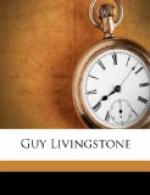There were a good many guests in the house at times, almost invariably men, but none of the wild revels of the old days, very little hard drinking, and no play to speak of.
One thing was remarkable—the great eagerness Guy displayed to keep the party together at night. He would engage us in arguments, and employ all sorts of ingenious devices to prevent us from going to bed, so that it became very trying to a weak constitution. I observed this to him one night when the rest had gone.
The slight flush left by the excitement of conversation was vanishing rapidly from his cheeks, and a gray tinge was creeping over them like that which we see on a sick man very near his end.
“It is too bad to keep you up, and too selfish,” he said; “but I find the nights so long!”
I left him without another word; but I lay long awake, haunted by that haggard face and dreary eyes. I wish I did not see them so often still in my dreams.
There were changes in other houses besides Kerton Manor, and a vacancy in the most luxurious set of chambers in the Albany.
Duns, and rheumatic gout, and satiety had proved too much at last for the patience of Sir Henry Fallowfield; so one night he preached his farewell sermon in the smoking-room of the ——, in which he was especially severe and witty on the absurdity and bad taste of a man condescending to suicide under any circumstances. The next morning they found him with—“that across his throat that you had scarcely cared to see.” The hand whose tremor used to make him so savage when he was lifting a glass to his lips, had been strong and steady enough when it shattered the Golden Bowl and cut the Silver Cord asunder.
Whether he was looking death in the face while he uttered those last cynicisms, and calculated on heightening the stage effect of the morrow, or whether a paroxysm of pain drove him mad, as it had done better men, who can tell? I think and hope the latter was the case, but—I doubt. Though Sir Henry Fallowfield had never read Aristotle, he had studied, all his life, the principles of the peripeteia.
Godfrey Parndon no longer ruled over the Pytchley. He had backed his own opinions and other men’s bills once or twice too often, and had retired temporarily into private life till he could get “his second wind.” The new M.F.H. was his complete contrast—pale-faced, low-voiced, mild-eyed, and melancholy as a lotus-eater—one of the class of “weak-minded but gentlemanly young men” that Tom Cradock used to ask his friends to recommend to him as pupils. The farmers missed sadly Godfrey’s bluff face and stalwart figure at the cover-side, while the “bruisers” from Leamington, and the “railers” from town, hearing no longer his great voice, good-naturedly imperative, adjuring them to “hold hard, and not to spoil their own sport,” rode over the hounds rejoicing.
Flora Bellasys was married.
It was just the match I thought she would make. Sir Marmaduke Dorrillon’s possessions were vast enough to satisfy any ambition, and his years put love out of the question.




